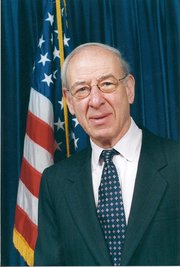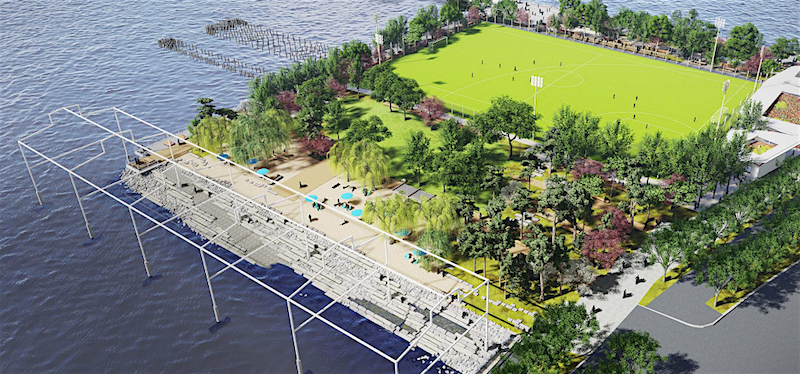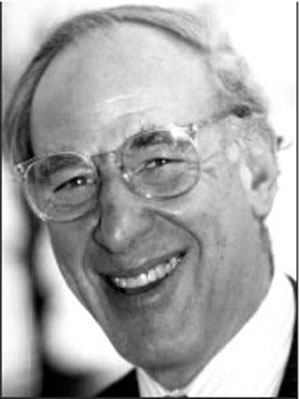BY LINCOLN ANDERSON | Franz Leichter, a longtime maverick progressive Democrat in the state Legislature and a heroic figure in the creation of the Hudson River Park, died on June 11. He was 92.
The cause of death was congestive heart failure, a condition he had reportedly battled for years.
Leichter served in Albany for nearly 30 years, first in the state Assembly from 1969 to 1974, then in the state Senate from 1975 to 1998, with his districts always based on the politically active Upper West Side.
The New York Times obituary described Leicther as “one of the Legislature’s staunchest liberals and harshest critics,” adding, “though he was often dismissed as a Don Quixote futilely tilting at windmills.”
Indeed, during his tenure in each house of the Legislature, the Republicans were the majority party, making it challenging for Leichter to pass bills on key issues. As a result, he became an outspoken critic of the state’s political status quo.
Leichter was a pioneer in supporting legislation on abortion rights, same-sex unions and decriminalizing pot. With Assemblymember Constance Cook, he passed the Cook-Leichter bill in 1970, which was the nation’s first bill to legalize abortion, and which influenced Roe v. Wade’s passage three years later.
Leichter championed campaign-finance reform for New York City. To help New Yorkers better deal with banking and avoid excessive costs and hidden costs, he regularly published a Consumer’s Guide to Banks.
He was a scourge of so-called corporate welfare, including tax breaks allegedly required to keep big companies from fleeing the city. He was also a critic of using taxpayer funds to build new sports stadiums, again, allegedly to keep sports franchises from leaving town. The new stadiums and arenas always include more luxury “sky box” seating for the affluent yet fewer affordable seats for average fans, as documented by reports by Leichter’s office. He was a champion of rent regulation.

Leichter even introduced the “pooper-scooper law,” which hit dog owners with a steep fine for not cleaning up after their dogs.
In Downtown Manhattan, Leichter is best remembered for the Gottfried-Leichter bill, which he passed with former Assemblymember Richard Gottfried in 1998, and which created the Hudson River Park. The park plan emerged after the defeat of the Westway megaproject, which would have put the West Side Highway into a tunnel running under swaths of new landfill to be added in the Hudson River, on top of which new building development would have occurred.
The park runs from Chambers Street up to W. 59th Street. Until the Gottfried-Leichter bill passed, though, Greenwich Village was a hotbed of resistance to the park project, led by the group the Federation to Preserve the Greenwich Village Waterfront and Great Port. There were concerns that the park would bring people streaming through the neighborhood, that the park’s governing body, a state-city authority, would be “unaccountable,” and that the park would be used to build high-rise housing west of the highway. The leadership of Community Board 2 was against the park, too, until future City Councilmember Alan Gerson was elected the board’s chairperson, leading to a change of direction.
Noreen Doyle, the president and C.E.O. of the Hudson River Park Trust, the state-city authority that operates and is building the park, recalled Leichter as a “rare person.”
“Hudson River Park mourns the loss of former state Senator Franz Leichter,” she said in a statement. “He was that rare person who maintained the courage of his convictions despite obstacles and slingshots, always focused on pursuing positive change on behalf of his constituents and all New Yorkers, regardless of what was popular at the time. Twenty-five years ago, then-Senator Leichter sponsored a bill to create Hudson River Park, alongside recently retired Assemblymember Richard Gottfried, and eventually found a champion in former Governor George Pataki. After his retirement from the state Legislature in 1998, Franz continued to serve Hudson River Park as a Trust board member for many years.


“The Hudson River Park of today — approaching completion, brimming with activity along its 4 miles — would not exist without Franz’s steadfast belief in the park,” Doyle stressed. “The entire Hudson River Park community is forever grateful to Franz for his vision, resolve and commitment to the dream of a financially sustainable, environmentally responsible and publicly accountable park along Manhattan’s West Side waterfront. We will continue striving to live up to that vision.”
On a smaller scale, Leichter also spearheaded the creation of Riverbank State Park, a 10-block-long park built atop the North River Water Pollution Control Plant, a sewage treatment facility on the West Harlem waterfront.
Gottfried, who retired from the Assembly last year, said of Leichter: “He was one of the most principled people I’ve ever known and a consistently progressive, dedicated legislator. We were fortunate to have him in the Legislature.”
Jonathan Bowles, who served as Leichter’s research director from 1994 to 1998, said the lawmaker “was always ahead of his time.”
Franz Leichter was born in Vienna, Austria, where his parents were prominent members of the Social Democratic Party. As such, they were among the Nazis’ “most wanted,” a profile article on Leichter in the Swarthmore College Bulletin, noted.
With his father, Otto, and brother, Henry, Leichter, who was then just 7 years old, managed to flee the Nazis, making it to America. His mother, Käthe, a prominent sociologist, stayed behind a bit longer to arrange safe passage for her mother and Franz and Henry, but perished in Europe amid the Holocaust.
In the U.S., Leichter attended public schools, going on to graduate from Swarthmore College and Harvard Law School.
He retired from the state Senate in 1998, with future state Attorney General Eric Schneiderman then taking over his seat. In 2000, President Bill Clinton appointed Leichter a director of the Federal Housing Finance Board, on which he continued to serve under President George W. Bush into 2006. Governor David Patterson then tapped Leichter for the New York State Banking Board in 2009 and he served for two years.
Leichter’s first marriage was to Nina Williams, who died in 1995 after losing a struggle with depression and mania. Their daughter, Katherine, directed a movie, “Here One Day,” about Nina’s suicide.
In 2001, Leichter remarried, to Melody Anderson.
Franz Leichter’s survivors include his daughter, Katherine, a son, Joshua, four grandchildren, Memphis, Ethan, Otto and Theo, and great-grandchildren.
Gottfried noted that he was the Assembly co-sponsor of the 1971 bill that state Senator Leichter introduced to legalize adult-use recreational marijuana. That bill went nowhere. Finally, after decades, in 2021, New York State legalized weed.
That ’71 bill, Gottfried said, “was just about the same as what we enacted 50 years later. … We all knew that marijuana was a lot less dangerous than alcohol,” he noted. “People die from alcohol. No one has ever died from a marijuana overdose. They may fall asleep. … That bill was an example of how advanced Franz’s thinking was on countless issues.”
Gottfried said the two things he’s personally most proud of in his lengthy legislative career were the passage of New York’s Child Health Plus insurance plan and the creation of Hudson River Park.
On Thurs., June 15, Hudson River Park officials and local leaders gathered for the ribbon-cutting for the completed renovation of Chelsea Waterside Park. Located just across the highway from Chelsea Piers, the 2.5-acre park is part of the larger Hudson River Park. Gottfried was among the group.
“Franz’s name came up frequently,” he said.


Be First to Comment